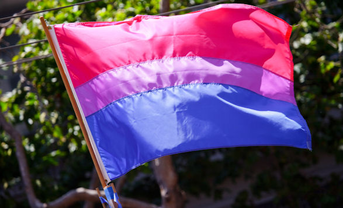
I spent last weekend at Bicon 2012, and when Squeamish Kate asked me to write about it for this site, I wasn't sure where to start at first. But then I realised that when I've said where I've been, I often get the same few questions: what? how? And, perhaps most often – why? So I'll do my best – newbie to the scene that I am – to answer them. Not necessarily in any particular order mind you...
The most straightforward is probably the 'what?'
As the name might suggest, it's largely a place for bisexuals. But the event is not exclusive – as the main website explains, “We don't all use the labels "bi" or "bisexual" or even agree on what it means to be bi, but bisexuality is the common theme.” Friends, allies, lovers and the curious are welcomed with open arms, so long as they abide by the code of conduct (which I'll come onto in a moment).
The event takes place in a different part of the UK each year, and always involves a weekend at a venue that offers space for socialising, a range of workshops, large plenaries, as well as on-site accommodation – usually a university campus. There will be various social events, about 20-30 workshops a day, and full-time first aid and listening services available.
And (I'd like to stress this point) the whole thing is run by volunteers. Different teams take on the organisation of each year's event, and there is also an organisation that makes sure there is continuity in things like accounting and management. On top of this, every session and workshop is run by a volunteer. Many organised in advance, some arranged during the weekend when people think of something they'd like to do – for example, as this year's Bicon was in Bradford, someone organised the “Bicurryious” outing to sample local curries.
If it weren't for the fact that by the end of the weekend there are several volunteers needing a bit of tlc and drink buying, it would be very easy to believe there was a paid professional set up behind it. Rather than an unpaid professional set-up.
Bicon has evolved over the years. Last weekend marked its 30th anniversary, and there has been a lot of evolution over that time. There's a great article that gives a sense of some of the changes that have happened over three decades.
I went to part of Bicon 2004 before attending all of this year's event, so I'm certainly no authority. But it's interesting to hear about things such as the evolution of the code of conduct. It sounds like it could be a scary or draconian idea, but actually it has evolved, voted on by attendees and members. It's common sense in many ways, and seeks to make sure people are looked after – that no one will post a photo of you at Bicon on the internet without your permission, that any kind of harassment will be taken seriously.
Bicon may not be the perfect event, but it feels like a space where concerns are taken seriously and listened to. There are large crossovers in the bi community with poly – people who don't follow traditional monogamous models of relationships, and with the trans community. There's work to be done in making sure that there are safe spaces for people of colour, and that everything is accessible.
Now, I'm a white, cis-gendered, middle class woman without any experience of disability, and I don't want to claim to speak for everyone because that would just be ridiculous. But as far as I can see, Bicon is a space where inclusion is taken seriously, where privilege is challenged, and you can't get away with making bigoted remarks. I'd love to hear from others about their experiences and feelings of Bicon.
Which brings me neatly on to the question of 'why?'
Despite being actively involved in the LGBT movement from a relatively early age, I didn't spend much time, if any, in exclusively bi spaces.
Despite the fact that I've written about biphobia for both lesbian and hetero magazines, I didn't think to look for a bi-specific space. And then I spent a weekend at Bicon and it changed my mind.
There is always going to be a bi community, if we take the idea of a groups of people sharing characteristics as a community. And there are things that are specific to that community – much higher incidences of mental health problems for one, along with health practitioners who are still thrown by the idea of someone having lovers of more than one gender. What Bicon, and the other events that flow out from it into the long year between cons, do is to claim that community and build it in a positive way.
One of the organisers gave a short speech to this effect at the closing plenary that made me choke up slightly. There isn't much of a bi community out there – most of the time. And then you go to Bicon, and there is.
It was an amazing bubble to enter and I have found coming back to earth a bit difficult. But it's given me an appreciation for what volunteers and community organisers can do, and a passion to get back into activism.
I loved it. I'm coming back. Join me next year in Edinburgh!
Squeamish Louise


 RSS Feed
RSS Feed
